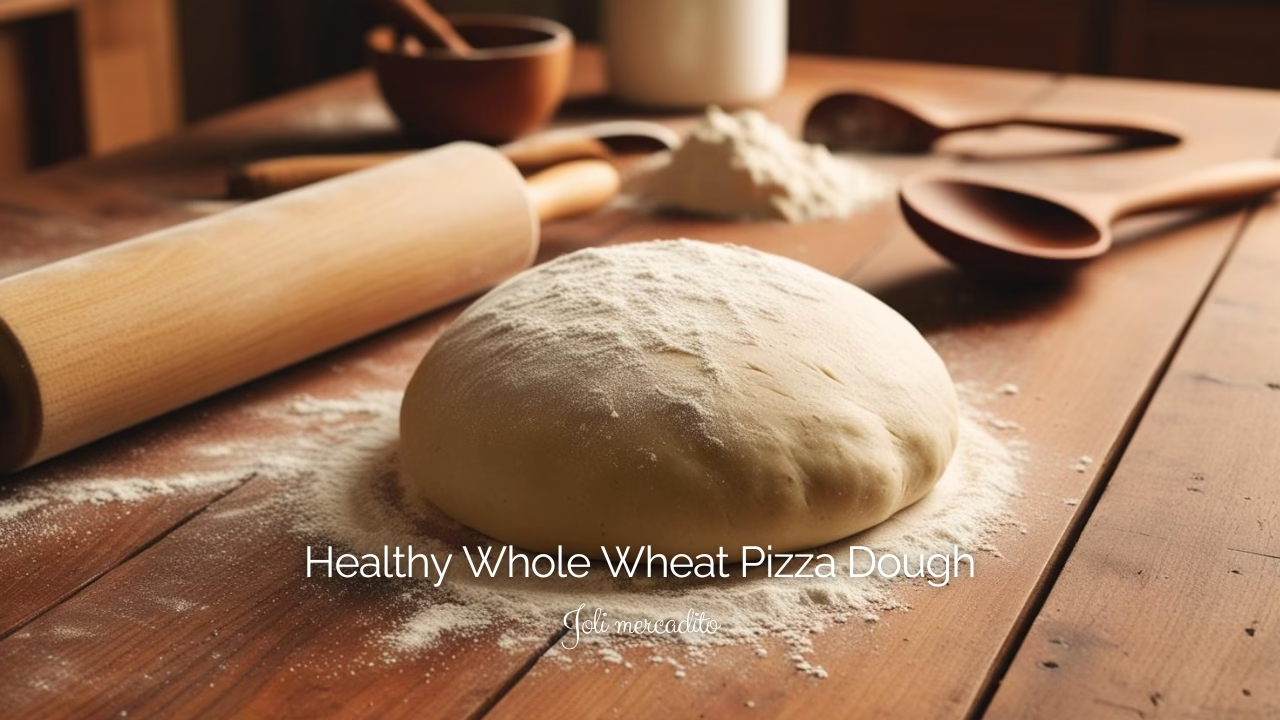Whole Wheat Pizza Dough with Long Fermentation
Discover how to make a simple and nutritious whole wheat pizza dough with this step-by-step recipe. First, it starts with a combination of whole wheat and all-purpose flour, ensuring a balanced texture. Next, long fermentation allows the dough to develop a rich flavor while improving digestibility. Moreover, healthy ingredients like olive oil not only enhance the taste but also contribute to better blood sugar control. As a result, this dough is not only easy to prepare but also perfect for creating delicious, guilt-free homemade pizzas that everyone will enjoy!
Low Glycemic Index Pizza Dough Recipe
Ingredients:
- 300 g whole wheat flour
- 200 g all-purpose flour (to soften the texture)
- 10 g salt
- 5 g sugar
- 3 g dry yeast (or 10 g fresh yeast)
- 350 ml warm water
- 2 tbsp extra virgin olive oil
Step-by-Step Instructions:
1. Activate the Yeast
- Mix the yeast with sugar and 100 ml of warm water in a glass.
- Let it sit for 5-10 minutes until bubbles form (this means the yeast is active).
2. Prepare the Dough
- In a large bowl, combine the flours and salt.
- Make a well in the center and add the yeast mixture, remaining warm water, and olive oil.
- Mix until you have a sticky dough.
3. Initial Kneading
- Transfer the dough to a lightly floured surface and knead gently for 8-10 minutes.
- If too sticky, add a little flour (but avoid overdoing it; the dough should be soft and elastic).
4. Cold Fermentation
- Place the dough in a lightly oiled bowl.
- Cover with plastic wrap or a damp cloth and refrigerate for 24-48 hours.
- During this time, the dough will develop flavor and become easier to digest.
5. Bring to Room Temperature
- Remove the dough from the fridge and let it sit at room temperature for 1 hour.
- Gently press the dough to release air bubbles and divide it into 2-3 portions (depending on the size of the pizzas).
6. Shape the Bases
- Roll out each portion on a floured surface with your hands or a rolling pin.
- For airy edges, stretch the center more and leave the edges slightly thicker.
7. Bake
- Preheat the oven to the highest possible temperature (250°C/482°F or higher).
- Place the dough on a pizza stone or baking sheet.
- Add your favorite toppings.
- Bake for 7-12 minutes or until the crust is golden and crispy.
Tips for Perfect, Low-GI Pizza:
- Freezing: Store extra dough in the freezer before or after fermenting.
- Hydration: Whole wheat flour absorbs more water. If the dough feels dry, add a small splash of water.
- Healthy Toppings: Use fresh, light ingredients like roasted vegetables or fresh mozzarella.
Why This Dough Has a Lower Glycemic Index
- Whole Wheat Fiber:
The bran and germ in whole wheat flour slow down carbohydrate absorption, preventing rapid blood sugar spikes. - Long Fermentation:
The yeast breaks down complex carbohydrates during fermentation, further reducing the glycemic impact and making sugars more gradual to process. - Flour Blend:
Mixing whole wheat and all-purpose flour balances texture while keeping the low-GI benefits of whole wheat predominant.
Additional Tips for Lower GI Pizza:
- Increase Whole Wheat Flour: Use up to 70-80% whole wheat flour (e.g., 350 g whole wheat, 150 g all-purpose) for even lower GI.
- Add Healthy Fats: Olive oil slows carbohydrate digestion, contributing to a lower GI.
- Toppings:
- Use unsweetened tomato sauce.
- Add lean proteins (chicken, tuna, low-fat cheese).
- Include fiber-rich veggies like spinach, mushrooms, bell peppers, or onions.
- Avoid processed meats and fatty cheeses.
- Pair with Fiber-Rich Foods:
Serve with a salad or fiber-rich side (like avocado or beans) to further reduce glycemic response. - Portion Control:
Even with a low GI, larger portions can increase glycemic load. Stick to a reasonable serving size.
Bonus Benefits
Using techniques like long fermentation and whole wheat flour not only lowers the glycemic index but also enhances digestibility and boosts nutrition, making this pizza a guilt-free indulgence!
Enjoy your healthier, homemade pizza! 🍕






